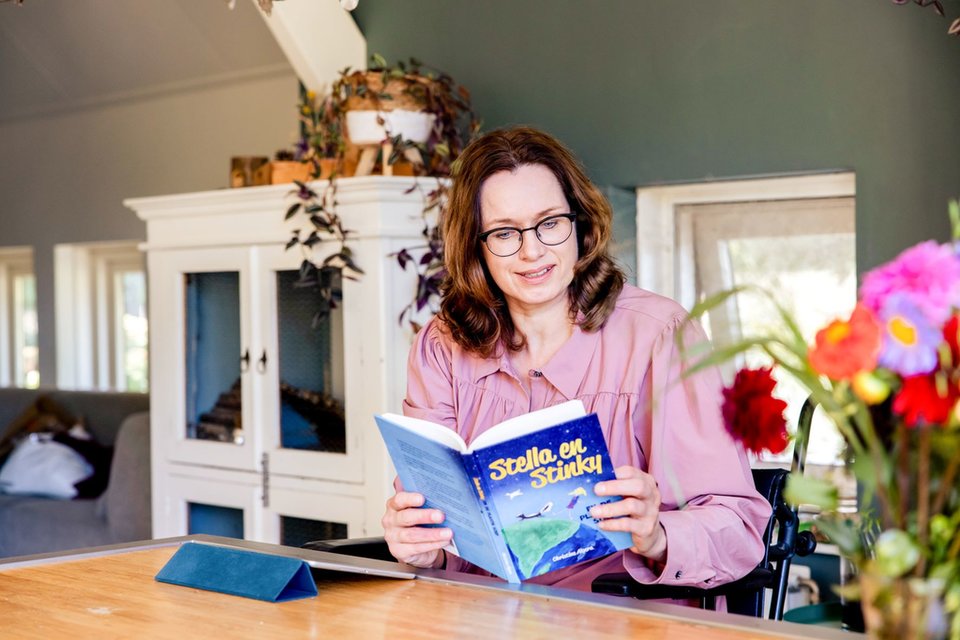Interview
Christine (50): “I never imposed a sustainable lifestyle on my children”
With a pension with Nationale-Nederlanden, you help build a sustainable future. But scheme members are also committed to sustainability in other areas. How children’s book author Christine does it? “I have thought at times: When are my daughters going to rebel against my sustainable lifestyle?”
Christine is happy that the topic of sustainability is getting so much attention these days. She has begged for that for years, she says, laughing. “When I first started working on climate 25 years ago, many people still thought it an issue only for back-to-nature nerds.”
Christine loved animals even as a child. Her childhood dream: working at Greenpeace. That dream became a reality. After studying Biology, she became even more convinced: To keep our planet liveable in the future, we need to look after it better.
After her time at Greenpeace, she worked for many years as a communications officer for large government institutions, where she mainly focused on solar energy and sustainable construction.
Christine is now a writer of children’s books. The theme of her books is sustainability. Seven years ago she published Stella and Stinky and the plastic soup, her second book is almost finished.

How do you incorporate sustainability into your daily life?
“I buy mostly second- and third-hand clothes. I eat no meat, rarely fly and don’t own a car. I also have a subscription with an organic farmer and have renovated my house in a sustainable way, with solar panels for example.”
- ‘We used to take a garbage bag to the dunes and clean up the litter.’ -

Are you worried about the future of our planet?
“I have a positive mindset, but I see many things not going well. Biodiversity is declining, oceans are filling up with plastic, the Earth is warming, forests are being cut down. And the list goes on. So yes, I do worry about my children’s future.
At the same time, I think it is important to also own up to my own responsibility. You can stay in bed with your head under the covers, or call on the government to effect change, but that won’t get you far. I want to do something. That’s why I write books about sustainability. And I consider the environment in almost everything I do.”
Was sustainability also an important theme in raising your children?
“I think they did subconsciously learn about it, as they saw me making sustainable choices. For example, we always used to go into the forest together to search for animals and mushrooms, which they loved. We also often went to the dunes. We used to take a garbage bag with us and clean up the litter there.
Still, I never imposed a sustainable lifestyle on my daughters, I think. I don’t believe in that very much, it really has to come from within. For instance, I thought they should decide for themselves if they wanted to be vegetarians. When my eldest daughter was about 10 years old, she came to me: ‘Mum, I don’t want to eat meat anymore.’
I have thought at times: When are my daughters going to rebel against my sustainable lifestyle? But that never actually happened. They are now 17 and 19, and still find the subject important. The youngest recently went by train on a camping trip on the island of Terschelling, instead of taking a holiday abroad.”
As an independent entrepreneur, you have to arrange your own pension. Is the climate an important consideration for you when it comes to your pension?
“Absolutely. I invest my money only in sustainable funds. In addition, I save in a sustainable way. Another thing I’d like to mention: I am chronically ill and in a wheelchair. In retrospect, I am extremely glad I took out occupational disability insurance in time (with Movir, part of Nationale-Nederlanden, ed.). Many self-employed people think: something like that won’t happen to me. But it can really happen. I also never thought I would get sick.”
Christine’s sustainability tip:
“It may sound strange, but I have a subscription to sustainable toilet rolls. With those bamboo sheets, for which no trees are cut down. The wrappers are very cheerful, they make me really happy.”
What do you expect of financial services companies in terms of sustainability?
“They should be transparent about where they invest your money. Banks and pension providers have a very big responsibility, I think. They manage so much money, from so many people. Personally, I always check very carefully what financial services companies invest in. I also point that out to friends and relatives. Please check what your money is invested in. Enquire or Google it, it’s pretty easy to find. Then you can really make a difference.
At my former employer, we were given a savings account with which to save for additional training, things like that. But the bank in question was not sustainable. Then I said: I’ll find a sustainable bank myself. It’s my money, right? That felt so much better.”

Drie generaties over duurzaamheid
How important is the issue of sustainability to other generations? In addition to Christine, we also spoke to student Babke (24) and entrepeneur Mark (35).

You can create new feedback forms in the Feedback Tab of this project